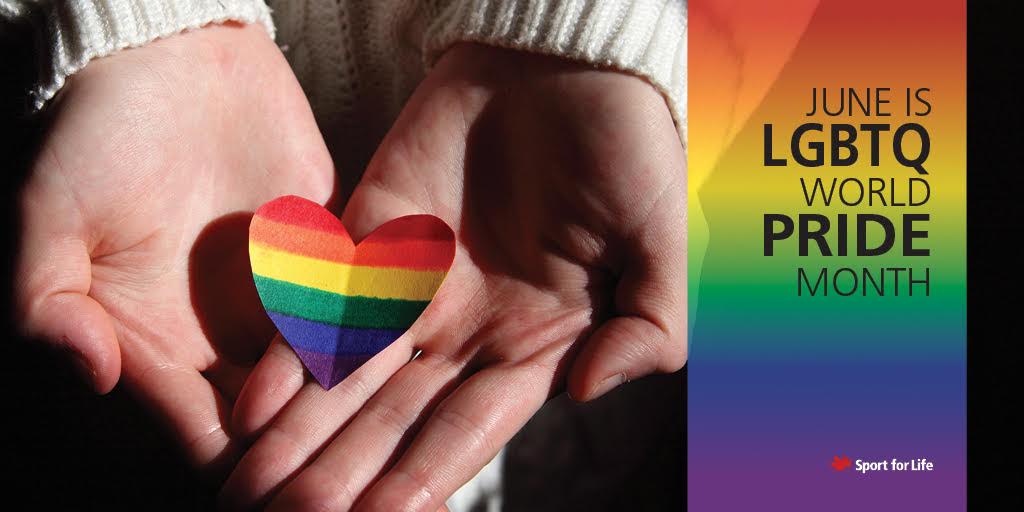Voices of Pride Month, Volume I
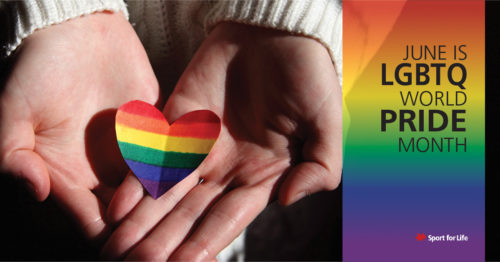 Pride Month is an annual opportunity to celebrate the rich diversity of the LGBTQ+ community. Beyond the typical parades and festivities, it’s also a chance for the greater public to learn about the unique perspectives and lived experiences of people of all sexualities and gender identities.
Pride Month is an annual opportunity to celebrate the rich diversity of the LGBTQ+ community. Beyond the typical parades and festivities, it’s also a chance for the greater public to learn about the unique perspectives and lived experiences of people of all sexualities and gender identities.
This year Sport for Life reached out to various members of the LGBTQ+ community to learn about their relationship with movement and physical activity. And though this is a month of celebration, it’s also a time to acknowledge the historic and contemporary barriers that exist, and the discrimination many athletes and participants face.
This is the first of two compilations of their stories.
Brie Chartier
Physical activity is quite literally a matter of life and death for Brie Chartier, who is a trans woman who first experienced rock climbing during a rappelling course with the Boy Scouts. It has since become a lifelong passion that has given her the chance to achieve her goals.
“It’s my main coping mechanism. Without my sport I wouldn’t even be here. When I was 20 or so I bought a book on how to rock climb and taught myself. Back then I was a closeted trans person, and hadn’t even come out to myself, but climbing offered this kernel of self-esteem because it was something I was good at,” she told Sport for Life.
“It was a self-selected challenge where I could push myself, but it also offered this kind of Zen meditative state where I could get into this flow state. When you get the right amount of challenge it helps facilitate this calmness, and it was my way of escaping the noise in my head,” she said.
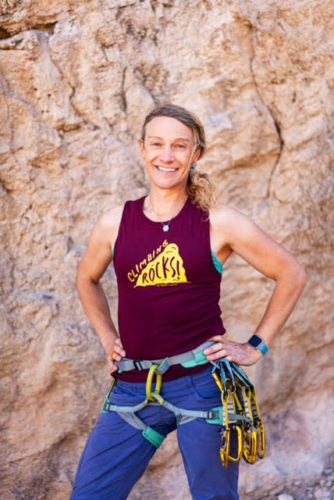
Brie Chartier
From there she became involved in other outdoor sports, including running, mountain biking and skiing. Once she transitioned, she was thrilled to find communities that accepted her as she was — despite the rampant transphobia that still exists in society.
“In the skiing community I was really included, and I benefited from that experience so much. They welcomed me not as an honourary trans person but as what I am, a woman who would benefit from the space just like every other woman there. I was lucky to find these spaces and to learn they do exist. Sometimes it just takes standing up and claiming your space, then people will welcome you.”
That being said, she thinks there’s more work to be done to ensure trans inclusivity becomes the norm.
“I think access to sports is critical, for trans kids even more than other kids, because everybody’s different and everybody’s looking for a space and a community. There’s not a lot of other things that are universally available to kids. We see some cool events where the queer community comes together to engage in a Pride run or a Pride bike ride, and that gets people moving and building community. I’d like to see some of that,” she said.
“I think this is a great opportunity for organized sports to think about ways they could be more inviting and inclusive to the queer community, and especially to trans and gender non-conforming folks who face challenges in sport. There are a lot of small things that can make a difference.”
One of the best ways to address inclusivity is by reimagining how facilities are organized, she feels. Providing private spaces for trans and gender non-conforming athletes to change is one change she would like to see.
“When I started transitioning, I was very uncomfortable and wasn’t sure where I belonged and where I didn’t. I was apologetic about my identity and didn’t want to impact others, so I felt uncomfortable in male-gendered and female-gendered spaces. It was hard to find facilities I felt comfortable in so I stopped going to the gym for a while,” she said.
“There’s this instant background noise that challenges trans people to defend their right to exist in sports, which is a constant background stress. I think it’s important, especially in places like community centers and gyms, that they’re open about their policies and overtly welcoming to all people. They need to have statements that trans people are welcome in their spaces, and folks who work there and coach teams need to have better awareness.”
Robin McGeough
When Robin McGeough thinks about how sport and physical activity has impacted his life, he feels a bit conflicted. He competed at the provincial level as a springboard diver when he was younger, and now enjoys trail running and ultra-marathons. Being active has been a huge gift for him, and has given him a sense of community, but in the past it also meant being subjected to bullying.
“When I was competing in springboard diving I was definitely bullied, not for being gay but for being effeminate and different and not as competitive as my male counterparts. I really felt like I couldn’t release all of myself in that space and be accepted, so it was a bit of a double-edged sword because in a lot of ways it was the time of my life but in other ways it was really hard,” McGeough told Sport for Life.
“I still have hang-ups from that, when I enter spaces where it’s predominantly cisgendered heterosexual men it still makes me feel like an outsider. If I know there are queer or gender diverse people there it puts me a little more at ease because I don’t have to explain myself. Physical activity is such a huge opportunity to connect with yourself and for queer people I would highly suggest finding a space that accepts you for you.”
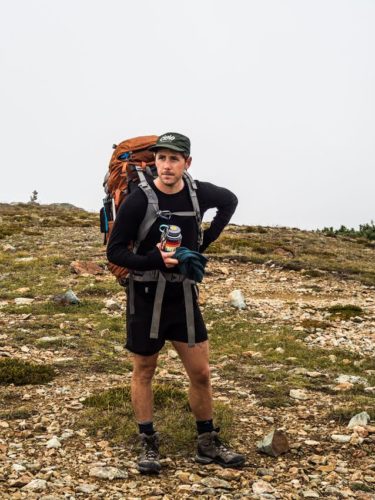
Robin McGeough
Reflecting on Pride Month, McGeough can’t help but think of the role models and elders who have been lost to the AIDS epidemic and other tragic outcomes.
“Pride Month for me is a way to look forward to the future where we can all be who we want to be and reflect on our history and see how far we’ve come. Now more than ever we’ve learned who underneath the LGBTQ+ umbrella isn’t being given a fair shot or being heard, particularly trans folks, people of colour and those living with disabilities,” he said.
“From a visibility standpoint, it’s great to see the world throw rainbow flags up but I’m always looking for ways we can do better, be more inclusive, and offer more opportunities and platforms to make sure everyone has a voice. Our role models died. We lost a huge swath of generations that should be speaking up, who aren’t here, and Pride Month is a chance to look at who those role models are that are still here and who we might not have heard from.”
In the sports world, McGeough admires skier Gus Kenworthy, who is gay. During the 2014 Olympics he kissed his boyfriend during a live broadcast, after winning a silver medal, and the moment made a big impact on McGeough. It gave him hope that social attitudes were changing, and that more space was being made for people with queer identities. He also admires Michael Sam of the NFL, and Olympic runner Caster Semenya.
“I’m not a sports person in general but I do appreciate athletes who use their platform to push for visibility and who normalize queer existence, diverse sexualities and gender expressions,” he said.
During his lifetime, McGeough feels that society has gone from being ignorant and hateful of LGBTQ+ people to finally struggling to understand and accept them. However, he feels there’s much more work to be done to address discrimination. At his job working for the Inter-Cultural Association in Victoria, he routinely encounters trans individuals who cannot find jobs due to their gender expressions. He also notes that trans women of colour are overrepresented as victims of violent assault. When it comes to sport organizations, he wants to see proactive change.
“I believe it’s important to move beyond ‘everyone is welcome’ to ‘we’re listening and we’re making this with you in mind’. It’s not enough to do a general call for inclusion, you have to listen to communities about how to make spaces safer and opportunities more authentic,” he said.
“Right now sport organizations are under the microscope, and they can be so exclusive if we’re not being proactive. As someone who was bullied and was reluctant to engage in sports because of that, messaging is key. Parents need to be a part of it, we need diverse role models, and we need to tell kids it’s okay to be you and there are people who will stand up for you.”
He feels particularly passionate about keeping trans kids in sport.
“Don’t go picking apart their identities because of politics. Let them be free and have fun. Build those positive relationships with diverse kids and give them a future of wellness, and they will be positive role models for years to come,” he said.
“If you put a rainbow sticker on your website or write a blog about Pride Month, you have to stand behind policies that make sure your organization is inclusive. Gender neutralize things, create safe spaces for gender diverse kids and do the work to reflect on what your responsibilities are to make safe spaces for people of all sexual orientations, gender identities, gender expressions and sex characteristics.”
Sergio Lopez Ramos
Sergio Ramos recently moved to Canada from Mexico, and as a gay man has a complicated relationship with organized sports. That’s because of the toxic masculinity and culture of aggressive competition he experienced while in school. He also witnessed widespread homophobia. These days he exercises for stress relief and to stay active, but still has an aversion to playing on a team.
“In Mexico when you’re a child, you always have to play with a team. You have no choice. And I really hated that. I hated all the competition and showing off to see who’s the best player, who’s fastest or whatever, and it made me not care about sports. I was always the last person to be selected to play on a team,” he told Sport for Life.
“Eventually I was like: ‘I don’t care about your sports’.”
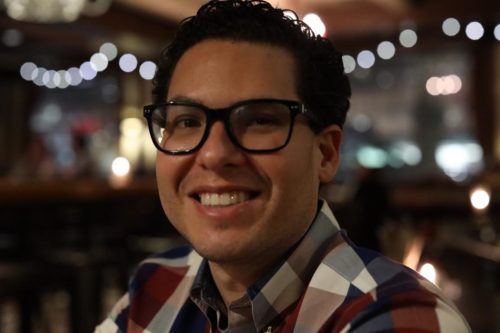
Sergio Lopez Ramos
Instead, he preferred solo pursuits such as swimming and running. Now in Canada he goes to the gym regularly, but not because he’s trying to achieve an aesthetic ideal. Though he’s happily out of the closet now, he’s concerned than many in the gay community put too much emphasis on looks. As a racial minority he often feels excluded from even the LGBTQ+ community because of the colour of his skin and his appearance.
“In Mexico and the U.S. and Canada, I’ve seen discrimination within the LGBTQ+ community. It’s like high school where there are the preppy boys, the most popular girls or boys, it’s all the same thing where there are certain standards and it’s hard to fit in. I live in Victoria and it’s a very white city, and when I say white it’s not just the colour of the skin but also the culture,” he said.
“And I also have conflicts with Pride because the mainstream Pride is very commercial. It’s marketing for big companies to reach new populations, I understand that, but I’m not sure what these big companies are actually doing regarding queer rights for their workers. They may agree love is love and that’s great marketing, but internally what are they actually doing?” he said.
“For me, Pride should be more political and have a call to action to dismantle and break down the systems of oppression we are facing.”
So when it comes to how children are introduced to sport and physical activity in school and through extracurricular programming, he believes they should have more agency.
“It’s challenging to satisfy everyone’s needs, but children should have the freedom to explore what they want, when they feel comfortable.”
Resources
- Canadian Center for Ethics in Sports: Sex and Gender Diversity
- Canadian Women in Sport: LGBTQI2S Inclusion in Sport Workshop
- Canadian Women in Sport: Webinars
- Egale: Resources
- Egale: Training and Workshops
- GLAAD: Sports News
- Leading the Way: Working with LGBT Athletes and Coaches
- LGBT Youthline
- LGBT Youthline: Online Resources
- LGBT Youthline: Resources
- Pride at Work: Events
- Pride at Work: Programs
- Pride at Work: Resources
- Pride Education Network: Resources
- Queer Events: Learning Resources
- Queer Events: Resources
- Queer Events: Workshops and Training
- Safer Spaces: Professional Development Workshop
- Safer Spaces: Resources
- The Federation of Gay Games
- viaSport: Adopting Inclusive Policy Language
- viaSport: Collecting Gender Identity Information
- viaSport: Creating Inclusive Environments
- viaSport: Inclusion in Sport Coaching
- viaSport: LGBTQI2S Inclusion
- viaSport: LGBTQI2S Inclusion Readiness Checklist
- viaSport: Trans Athlete Inclusion Guidelines
- YouCanPlay: Resources

